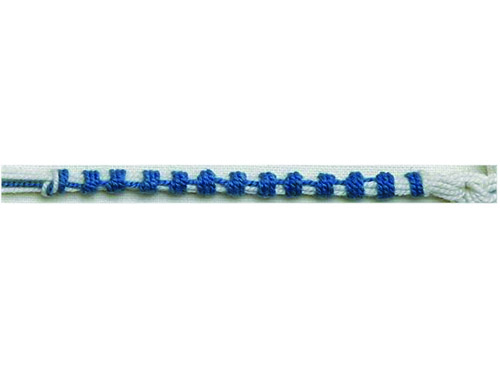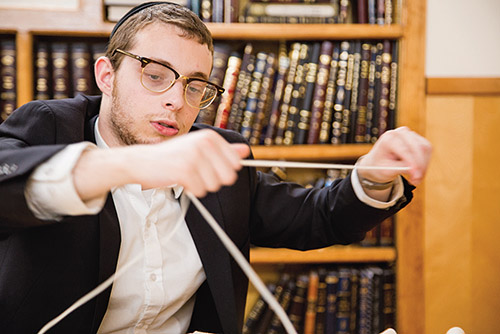



The first time Nesanel Epstein tried his hand at fixing tallis strings, he was all of 8 years old. He’s been hooked ever since.
He’s turned his love for this mitzvah into a business and, at age 23, has been doing so in earnest for the past three years. The name of his company is “The Tallisman.” As Epstein explained, “‘Fringe Benefits’ and ‘No Strings Attached’ were already taken.” The New Jersey entrepreneur was quick to explain that before he turned 13, all his work was supervised since it would be against halacha for a child to be involved in this practice without an adult to oversee it.
Additionally, not until he went to yeshiva out of town and needed extra money did his father, who is a rav, feel comfortable about him receiving payment for doing this mitzvah. Before that, his work was performed strictly as a chesed, often as part of a gemach, which supplies free goods and services for those in need.
As Epstein explained, “The Netziv writes in his commentary that every Jew should pick a mitzvah to make his own, and mine is tzitzis.” His reason? “Looking at them is a reminder of all the other mitzvahs, so one can then get involved in the other 612.”
Epstein has slowly built his business, mostly through word of mouth. Some of his first clients were in Florida, where he attended yeshiva. He also has a large base in Cherry Hill where he lives and people know of his work. He’s been branching out to nearby Philadelphia, but has clients as far away as Israel. Along with word of mouth, he’s had an advertising presence on religious social media sites. This past summer he put in some serious legwork, going on a number of road trips to Orthodox Jewish communities.
In conversation with The Jewish Link, Epstein discussed the myriad of different customs of tying strings of a tallis. Epstein effortlessly rattled them off—Ashkenaz, Sepahardi, Arizal, Temani, Breslov—explaining differences that can include the number of knots, how they are tied, the colors, or how thick or thin the tallis needs to be. In fact, he said there are 27 different types of customs of which he is aware. He has pored over the intricate laws but still continues to learn new customs. “Chabad,” he explained, “like thin tzitzis fastened by silk corners. This is their custom based off of Kabbalistic teaching.”
This past summer he met a Belzer chasid and learned the sect’s color of choice is a bluish-black. He explained that in the past they had gotten their taleisim from Turkey but had encountered shatnez issues. The bluish black became their custom and they know it’s good when they see that color. He also spoke about the number of times the string needs to be folded over, depending on which sage is followed.
Epstein proudly related that he redid the taleisim of the Bostoner Rebbe’s shul, including checking, retying and cleaning. In some cases there was a need to totally cut off the strings and put on new ones. Even for that, there is a right and wrong way. The knife he used was ceramic, which is permissible. He was also happy to report that his name has been added to a list of people who are verified to know how to properly tie techeiles (blue dye for strings mentioned in the Torah).
The challenges Epstein faces run across categories. On the mundane side, he has learned which postal service works best to assure that deadlines are met. He switched to Fedex, which he found the most reliable in addition to the bulk discounts it offers. Other challenges deal more with diplomacy, such as how to tell someone in a good way that the tallis he is wearing is clearly not kosher. Part of the trick is sensing whether the person is likely to take the criticism constructively. Other delicate issues include working with the non-Orthodox or even with women who would like to wear a tallis. For those, he defers to his father or another rabbi on how to or even whether to approach it.
As time goes on, Epstein has begun slowly branching into other items, such as holders, ivory boxes and other Judaica. “Besides taleisim, I sell ivory and unique colored tefillin holders,” he explained. At the core, however, it’s all about the tallis. Along with tying, fixing and replacing, he can have a tallis cleaned and even tailored. Based on preferred custom, a brand-new tallis can be ordered to whatever knotting specifications are desired. When asked why people should use his services versus those of others, Epstein stated that he has learned the laws, which are very important to him, and at the same time he offers personal service. “I’m not a factory.”
In his final comments, Epstein spoke of the need for a tallis to be fresh and clean. “When you look to buy an esrog, don’t you want the nicest one for the mitzvah? Why shouldn’t you want to beautify a tallis as well, rather than wearing one that has turned yellow or black?” “After all,” he added, “you are in front of Hashem. If you were to meet with the president, would you wear something that has turned yellow?”
Nesanel Epstein, “The Tallisman,” can be reached at 856-745-9588. His email is [email protected]. His brand-new website is www.TheTallisman.com.
By Robert Isler
Robert Isler is a marketing researcher and freelance writer who lives in Fair Lawn. He can be reached at [email protected].










